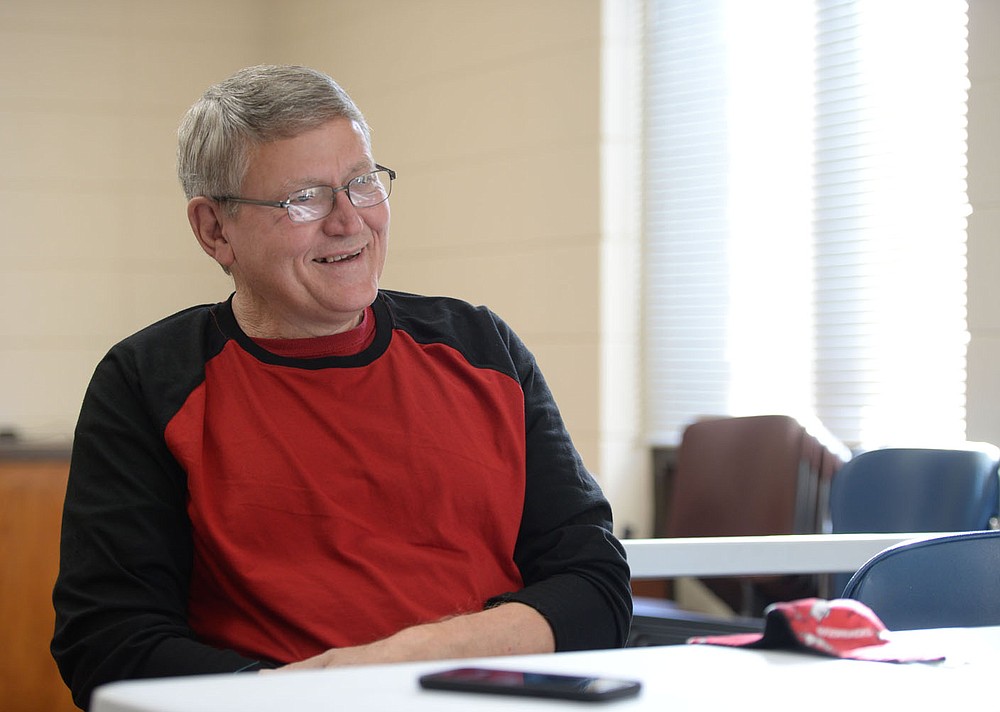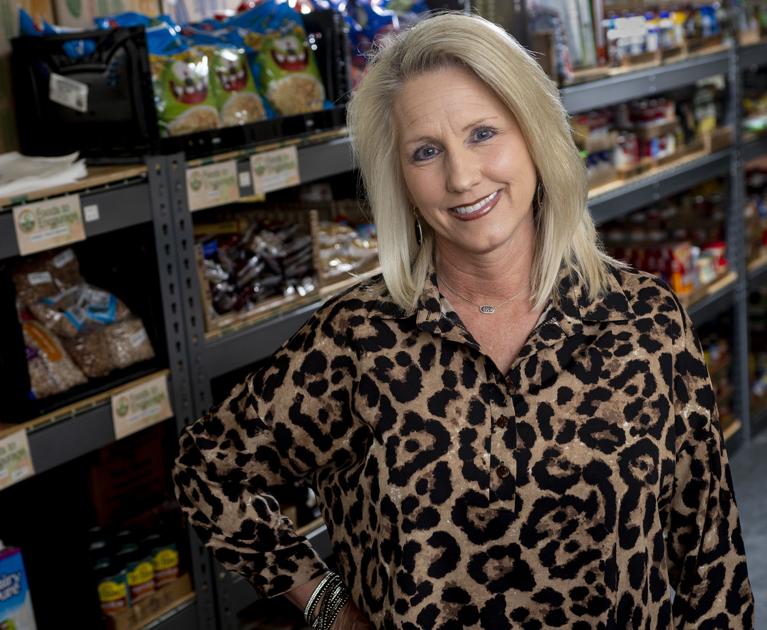Check out more our stories in the Tipping Point series. Click here.
• • •
Rich Threadgill was born and raised in California and loved his home state. Until he didn’t.
The Navy veteran is a gun fan, but he felt he couldn’t talk about his hobby or express other conservative opinions without running the risk of making someone angry.
This summer, when his employer allowed employees to telework from out of state for lower pay, the 39-year-old human resources officer surprised himself. He sold his Rancho Cordova home and moved the family to Idaho, where he’ll build a house for less than he sold his California home.
He says he feels more relaxed in a rural environment where people are more conservative and, to his mind, more congenial. “We love it,” he said.
“In California, if you express your beliefs, you can be outright attacked,” he said.
Threadgill is among a wave of hundreds of thousands of Californians leaving the state in the last few years. Last year alone, nearly 200,000 more people left the state than moved in.
Most likely did it for economic reasons. The cost of living, particularly housing, is now far higher in California than almost anywhere else in the United States.
But a turbulent 2020 has added new motivations for migration. Amid coronavirus shutdowns, wildfires, street protests and a tense election-year political environment, some say California’s “charm” has finally worn too thin.
‘California refugees’
After 21 years in Sacramento, Stephanie Lamour is leaving for a dream job teaching in a French culinary school in Houston. For her, Sacramento has gotten too busy and dirty. She’s distressed seeing homeless people daily on her trip to and from work downtown. She wants to explore new open roads on her motorcycle.
“I’m a very adventurous woman,” she said. “I will explore.”
Lamour is not particularly political. For others putting California in the rear window, politics is a big reason. Some conservatives say they’re tired of being red in a blue state, especially with so many political disagreements devolving into angry, ill-mannered confrontations in recent years.
Registered Democrats outnumber Republicans statewide nearly two to one, and hold the top state offices. In Sacramento County, 45% of registered voters are Democrat and 26% are Republican.
Cori Sarno Villacres, an attorney who isn’t shy about talking politics, moved in April from Elk Grove to Meridian, Idaho, where her voice can get traction. “We were starting to feel, no matter what we voted, it doesn’t matter anymore in California,” she said.
Her sense of disconnect in her home state started, she says, during the 2016 presidential election. “It crept into our lives. You express a different point of view, you get bullied.”
Villacres, who has a child with Down syndrome, thanked President Trump on Facebook for highlighting Down Syndrome Awareness month, and says it elicited some harsh criticisms of her and Trump rather than supportive comments focused on the syndrome.
The morning after Trump was elected, Villacres published on Facebook: “Donuts for the office. Because I am happy this morning. “ It didn’t go over well with some coworkers. Another time, a coworker took her aside to suggest she not talk politics in the office.
“What?” she said. “We can talk about these things.”
She admits she misses friends and associates in the Sacramento legal community. But, overall, in Idaho she feels more a part of a community. She and some neighbors call themselves “California refugees.”
“We have never been happier,” she said. “Bad cell service, that’s my only complaint about Idaho.”
Welcome to Texas!
It’s unclear how many conservatives are picking up stakes and leaving this year. But data from the Zillow real estate data firm show that more Californians are searching online in 2020 than in previous years for homes in Texas, Arizona, Nevada, Washington, Colorado, Utah and Idaho – a mix of mainly red and “purple” states.
For Sacramentans in particular, the most popular Zillow out-of-state new home search sites are Dallas, Houston, Las Vegas and Coeur d’Alene, Idaho.
That has not gone unnoticed by real estate agents or residents in those states.
Marie Bailey, a former Southern Californian, moved a few years ago to Prosper, just north of Dallas, where she launched a “Move to Texas from California!” Facebook group that she says has 21,000 members and has helped turn her into a pied piper for disillusioned Californians.
She offers services that range from finding a house to offering an online community to answer questions such as: What kind of bugs are there in Texas? Where are the good hair salons?
Some California transplants to Texas are Democrats. But, contrary to what some Texans fear, most arriving Californians are just as conservative as many Lone Star Staters, Bailey says.
Among recent Texas arrivals is licensed marriage and family therapist Doreen Diego from Orangevale, who moved to the booming Dallas suburb of Celina to take advantage of real estate values, but also because she wanted to live in an area where more people share her conservative and Christian values.
She’s hardly alone, she says. She reports one like-minded neighbor on her block, four houses down, from Elk Grove and another from Rocklin. Four other residents on her block moved there from Orange County.
In California, she says she felt like “the odd man out.” When she got to Texas, the clerk at Chick-fil-A wished her “a blessed day.” It surprised her, but it was a pleasant surprise. She hears it all the time.
“It’s as common as going to Hawaii and hearing ‘Mahalo,’” she said.
‘Bailing to Boise’
In Idaho, Rebecca Van Camp is broker and owner of the Relocate208 (Idaho’s main area code), a real estate brokerage specializing in relocation, and has a popular Facebook group called “Bailing to Boise.”
She tries to keep political commentaries to a minimum on the Facebook group, and focus instead on helping people negotiate their move to the Gem State. Nevertheless, “my typical clientele are conservative and seeking a conservative state,” she said. “Especially Californians. To be frank, they feel like they are escaping something.”
The most frequently asked Facebook question by Californians, though, isn’t political. It’s, “How cold is it?”
Increasingly, the questions are: Can I afford a house in Idaho? Are there even any available?
Idaho real estate prices are among the fastest-rising in the country, according to the Federal Housing Finance Agency House Price Index. Buyers with cash are elbowing each other out. In picturesque Coeur d’Alene, far up in the north state, it’s almost too late for the average Sacramentan to get a deal on a house. Prices there now match Sacramento-area costs.
Threadgill from Rancho Cordova says he ran into such a competitive real estate market when his family arrived in Twin Falls a few weeks ago that he and his wife decided to rent for now. They hope to buy some land in a more rural community outside of Twin Falls.
Idaho residents also have mixed feelings about the new arrivals from other states, especially Californians. Threadgill said he was warned about that. “We have friends from here who said, ‘Yeah, you just don’t need to announce to everybody where you are coming from.’”
But Threadgill said he has found Idahoans to be accommodating. No one has given him the “stink eye,” he says, although some are known to warn Californians not to bring any California ideas to Idaho.
Trump and a lack of civil discourse
The California diaspora is not new. State data show that California has lost net migration increasingly to other states most years during the last decade since the Great Recession, a period when housing prices soared in California.
It is not necessarily healthy for California to lose conservatives, says Jessica Levinson, a law professor and political commentator at Loyola Law School in Los Angeles.
The state needs a variety of voices in the public policy realm, she said. “We know from every study that diversity of viewpoints leads to better policy outcomes.”
She makes a distinction between conservatives who want to engage in respectful and serious policy discussions, versus more recently emboldened people on the political right who espouse opinions that are vitriolic, racist and non-substantive.
“The elephant in the room is that President Trump has apparently (changed) what is acceptable to say. He’s opened the flood gates for vile conversations,” she said. “Neither side can understand the other.”
In the Sacramento area, angry confrontations have spread this summer from the state Capitol steps to the streets of Placerville, where at times free speech has merged with hate speech.
In that climate, Levinson said, even old school Republicans, including those who do not support Trump, “feel ostracized and sidelined. I’m not saying let’s give Republicans a big hug right now, but we should allow for public policy differences.”
She predicts the rancor will last for some time, regardless of who is in the White House. “You can’t put the genie back in the bottle. This level of polarization does not just go away.”
Will COVID increase California exodus?
Politics aside, 2020 has posed another migration question: Will COVID-19 and the sudden embrace of telework cause young, tech savvy workers to leave the state?
For years, California and Silicon Valley in particular had been plucking the best and the brightest from elsewhere, attracted by well-paying, cutting-edge jobs. In contrast, people leaving the state annually in recent years are less educated, lower income workers, according to various analysts, such as the Public Policy Institute of California.
New census data indicate that, in 2018 and 2019, California started to lose some higher paid workers to other states as well, according to an analysis by economist Adam Fowler of Beacon Economics.
The COVID-19 pandemic may accelerate that trend.
Some companies are allowing workers now to telework from out of state, freeing them from living in high-cost areas like Silicon Valley, and even from Sacramento. That allows a company to pay lower salaries, based on lower cost of living in other states. It also makes the company more attractive to new hires, some of whom may not even need to move to California to land a Golden State job.
That should push California leaders to work harder on solving one of the state’s biggest economic and lifestyle problems, the lack of affordable housing.
“Our inability in this state, the lack of political will, to increase housing supply, that has been a blinking red warning light for a long time,” said Fowler of Beacon Economics. “If we are freezing out younger families, that is trouble.”
Boise tech company owner George Seybold said he sees teleworking as a boon to his business. He had considered launching his start-up, a networking company called Talloo, in Silicon Valley. But he decided he could launch in Boise with less cost and attract good employees.
“I think most of my employees will end up being from California,” he said.
In Texas, real estate agent Bailey says Gov. Gavin Newsom’s COVID-19 economic restrictions are a reason some people join her Facebook group. After the Walt Disney Company announced layoffs amid amusement park closures, she says, “all of a sudden, I’m getting a bunch of people who worked for Disneyland.”
California economy still attractive
There is no firm data yet on whether California’s coronavirus restrictions are adding to the exodus.
But California appears to have been hit harder by unemployment during the pandemic than some nearby states. The Texas unemployment rate was 8.3% in September. California’s was 11%. Idaho’s unemployment rate was at 6%, but was growing.
On the other hand, California is doing notably better on coronavirus suppression heading into the fall, a success that is considered important to being able to return to a stable economy sooner.
As of Wednesday, the California coronavirus test positivity infection rate was at 2.5%, according to Johns Hopkins University’s coronavirus data tracker. Texas is at 7.7% and rising. And Idaho’s is now among the worst in the country at 29.5%.
California had the lowest COVID-19 death rate of the three, Idaho the worst, according to the Centers for Disease Control and Prevention.
Will more California companies leave the state if educated workers want out? Likely, yes. The Charles Schwab investment firm announced this month its Dallas office will become its new headquarters in January instead of its San Francisco office, the result of its acquisition of TD Ameritrade. The announcement created shock waves, although Schwab will maintain its San Francisco presence and “expects to continue hiring in the the city.”
Despite such news, business leaders here say the state remains an attractive place to live and work, with a diverse economy that has shown the ability to adapt and expand across the decades.
“There is something to be said for having a substantial presence in the fifth largest economy in the world with 40 million consumers,” said Randy Getz, a commercial real estate broker with CBRE in the state’s capital, “a state that plays a leading role in tech and sophisticated manufacturing, alternative energy, transportation, medicine, culture, food.
“There are reasons, despite the challenges, people enjoy living in California. It is a wonderful place to be.”
In fact, as Silicon Valley and San Francisco struggle financially with COVID-19, many residents leaving the Bay Area are only moving as far as Sacramento and the Central Valley. And most people who leave Sacramento stay in state, heading a short hop to Stockton, Modesto, Fresno, and even to Los Angeles and San Francisco.
Some in Sacramento County who are conservative may also head over the county line to El Dorado and Placer counties rather than move out of state.
A weight has been lifted
Up in Idaho, far away from their former life in Sacramento, the Threadgill family is working on getting its bearings in Twin Falls
Rich Threadgill says he once thought the Sacramento suburb of Rancho Cordova was going to be his forever home. Now, he’s pretty sure it’s Idaho. Financially, he is better off, he said, even though he agreed to a lower salary when his employer OK’d his move.
“I don’t feel like I’m working just to pay the bills,” he said. “We’re comfortable.”
He feels better emotionally as well. He doesn’t worry about crime. He likes the open spaces. He appreciates the fact that if and when he talks about guns and the Second Amendment, he doesn’t have to fear blow back.
“I feel,” he said, “like so much weight has been lifted.”
Staff writer Phillip Reese contributed to this report.





More Stories
The 10 Best Low-Carb Snacks That Will Fill You Up
Bonner County Daily Bee
With Far more Vaccine Doses Coming, California Counties Scramble To Make Distribution Programs